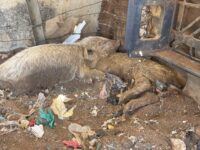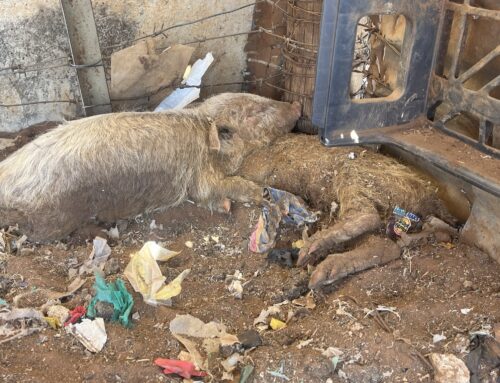During a recent inspection in Mpumalanga, the NSPCA uncovered alarming conditions at a government-backed fish farm specialising in Mozambican Tilapia, a practice often overlooked in our country’s agricultural landscape, which focuses on poultry, pork, and beef as primary protein sources. The findings of our Farm Animal Protection Unit Inspectors highlight the urgent need for increased awareness and regulation of fish farming practices in South Africa.
Upon arrival, our National Inspectors initially faced resistance from the farm owner, who refused entry and cited his constitutional rights. However, undeterred, our inspectors returned with a warrant and local SAPS assistance, allowing them to gain lawful access to the premises.
The state of the facility was deeply concerning. A significant portion of the building was exposed to the elements, adversely affecting the health and well-being of the fish. Notably, the absence of heating systems left water temperatures far below the optimal range for Mozambican Tilapia, which thrive in environments between 17°C and 25°C. Our inspectors observed the ponds in an appalling state, with visibility compromised by dirt and algae, showcasing a failure to maintain basic cleanliness standards. The caretaker admitted that the ponds had never been properly cleaned, simply drained and refilled without attention to the accumulated waste.
More disturbingly, a wheelbarrow filled with dead fish indicated a recent mass casualty event. The caretaker revealed that the facility had been without electricity for three days, leading to the untimely death of countless fish due to the lack of a backup system. Despite searching extensively, our inspectors found no signs of live fish; instead, indications of further mortality were evident as recent carcasses remained submerged, untouched. Alarmingly, the caretaker continued to feed the ponds as if the fish were still alive.
Further investigation revealed that this farm had been granted to the owner by the Department of Agriculture, Rural Development, and Land Reform, which had prior knowledge of the facility’s deteriorating conditions. The owner had even sought funding for structural improvements, raising serious questions about oversight and accountability.
The negligence displayed by both the owner and the department is unacceptable and has resulted in undue suffering for these fish. The owner believes that he will be supplied with more fish and infrastructure by the department. In response to our findings, we have issued the owner a written warning and have formally addressed our concerns to the responsible department. We are resolute in our stance that this facility must be shut down. Our pursuit of justice will not waver and we are currently considering our legal options.
If you are as passionate about animals and their well-being as we are, consider supporting our causes by donating.
Latest News Posts
Will You Be the One Who Takes Action?
Most people will scroll past this. But will you be the one who stands up for animals?
Animal welfare isn’t always in the spotlight, but it changes lives – for every neglected, abused, or suffering animal we help. Our teams work tirelessly, often behind the scenes, ensuring animals across South Africa are protected.
This work is relentless. The challenges are immense. But with more hands, hearts, and resources, we can do even more.
The equation is simple: the more supporters we have, the greater our reach, the stronger our impact.
Be part of the change. Become an NSPCA Project Partner today. From just R50 per month, you can help ensure that no animal suffers in silence.








